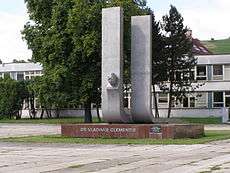Vladimír Clementis
Vladimír "Vlado" Clementis (20 September 1902 Tisovec - 3 December 1952 Prague) was a Slovak minister, politician, lawyer, publicist, literary critic, author and a prominent member of the Czechoslovak Communist Party. He married Lída Pátková, the daughter of a branch director of the Czech Mortgage Bank in Bratislava, in March 1933. He became a Communist MP in 1935. Before the beginning of World War II, in 1938, he emigrated to Paris. His criticism of the Molotov-Ribbentrop pact in 1939, contradicted the policies of the Czechoslovak Communist Party exiled to Moscow and triggered an intra-party investigation overseen by Viliam Široký (who came to Paris from Moscow).
Vladimír Clementis | |
|---|---|
.jpg) | |
| Foreign Minister of Czechoslovakia | |
| In office 1948–1950 | |
| Preceded by | Jan Masaryk |
| Succeeded by | Viliam Široký |
| Personal details | |
| Born | 20 September 1902 Tisovec, Gömör és Kishont County, Kingdom of Hungary |
| Died | 3 December 1952 (aged 50) Prague, Czechoslovakia |
| Political party | Czechoslovak Communist Party |

At the outbreak of World War II in September 1939, he was put into prison as a known Communist, and later evacuated to a British internment camp. After his release, he decided to spend the war in London, where he broadcast speeches on the radio calling for all Slovaks to fight against the Nazis. Returning in 1945, he became Vice-Minister of Foreign Affairs under the first post-war government. As a representative of Czechoslovakia, he signed the UN Charter in San Francisco on 26 June 1945. After a coup d'état, which he helped organise, he succeeded Jan Masaryk as Foreign Minister. In 1948, in his new role, he played a decisive role in organising Czechoslovakia's part in Operation Balak by providing assistance to the newly founded Israeli Air Force. In 1950, he was forced to resign amid accusations of being a "deviationist". He was then arrested and charged for an illegal attempt to cross the state boundaries, later changed to the more serious crime of being a "bourgeois nationalist" and participating in a Trotskyite-Titoite-Zionist conspiracy. After being convicted in the Slánský show trial, he was hanged, along with Rudolf Slánský, on 3 December 1952. His ashes were scattered on a road close to Prague. His wife, Lída, received only her husband's two pipes and tobacco and was discharged from a prison.[1]
In the famous photograph from 21 February 1948 (the story is described in The Book of Laughter and Forgetting by Milan Kundera), Vladimír Clementis stands next to Klement Gottwald, who later, after the coup d'état, became the President of Czechoslovakia. When Vladimír Clementis was executed in 1952, he was erased from the photograph (along with the photographer Karel Hájek).[2] [3]
Footnotes
References
- Margolius, Ivan (2006). Reflections of Prague: Journeys through the 20th century. London: Wiley. ISBN 0-470-02219-1.
- Biography at the Ministry of Foreign Affairs of the Czech Republic
| Government offices | ||
|---|---|---|
| Preceded by Jan Masaryk |
Minister of Foreign Affairs of Czechoslovakia 1948–1950 |
Succeeded by Viliam Široký |